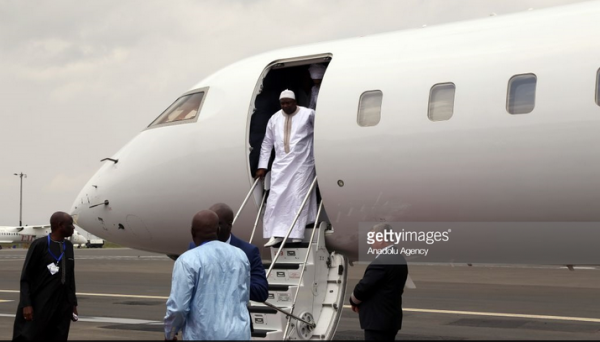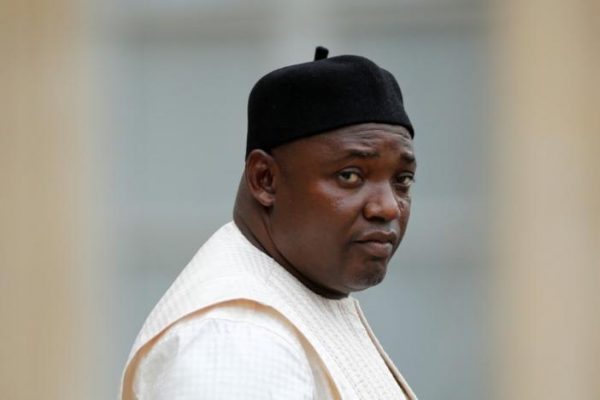 President Adama Barrow of the Gambia will Tuesday morning leave for Kigali, Rwanda, to attend the extraordinary meeting of the heads of state of the African Union.
President Adama Barrow of the Gambia will Tuesday morning leave for Kigali, Rwanda, to attend the extraordinary meeting of the heads of state of the African Union.
Mr Barrow who will be accompanied by a large delegation will Wednesday join other African leaders to sign an agreement that will launch the African Continental Free Trade Area (the AfCFTA), making the continent the largest free trade area created since the formation of the World Trade Organisation.
The extraordinary meeting of the heads of state of the African Union is convened by President Paul Kagame of Rwanda, who is also the chairperson of the AU.
Mr Kagame has described the AfCFTA as a “historic pact which has been nearly 40 years in the making, and it represents a major advance for African integration and unity.”
A day before the signing, government delegations will join Africa’s top business leaders and other stakeholders to exchange views on the continent’s economic transformation through trade at a special day of celebration and dialogue called the AfCFTA Business Summit.
The progressive trade liberalisation of Africa in the years ahead will mean new opportunities for African companies to compete and cooperate across borders and build continental reach. However the success of the AfCFTA will depend on closer collaboration between policy makers and the private sector.
The AfCFTA is a flagship project of Agenda 2063, the African Union’s long-term vision for an integrated, prosperous and peaceful Africa. The Free Trade Area has the potential to transform the fortunes of millions of Africans by boosting trading ties between Africa’s nations.
Meanwhile, Uganda’s President Yoweri Museveni has unexpectedly cancelled his planned visit to Rwanda. This comes a day after Nigeria’s President Muhammadu Buhari also opted out of the Kigali conference, saying he wanted further domestic consultation on the continental deal that would remove trade barriers and eventually allow free movement.






Another African ” white elephant”
Mike
Give them a chance. EU too had been described as a bureaucratic behemoth and was destined to fail becauae of myriad of conflicting economic and political interests. They synced their evonomies, reduce deficits (even thought countries like Italy constructed shenanigans to meet the criteria by debt capitalisation) yet they became a good player and huge market in the world economic scene. They projected evonomic power and political influence which individually them could not.
Give AU chance and even if we fail, at least they have tried. There are many diseconomies in their trade and capital moilisations, untapped competitive advantages which would have propel the African nations from end user consumerism to potent producers of their own domestic manufactured products. That will reduce import cost and in the long run, empower their currencies. I agree more need to be done especially good governance, corruptions and entrenched democratic values as well legal reforms.
RSA and Nigeria objected and did not sign. This is not necessarily a bad thing as the presence of these two economies will derail any meaningful progress that this great initiative can make. The impact on trade in the continent will cause other world economic powers to pause. Africa has arrived.
They have some reservations much of which was spurred by domestic politics and entrenched loppy power. So was Europe in the formation stage. They had to moderate the debt/GDP or deficit ratio for some countries you meet thr admission cliteria.
There eas two tier membership and gradually other countries re-aligned. Once RSA and Nigeria sense sucess they will come arround inshallah.
I think Nigeria and South Africa’s reticence {Africa’s two largest economies} absence will negate any impact this agreement will make/ My experience with speaking with African’s from many other nations is there are significant differences between the level of goodwill towards one and other/To compare Africa to Europe is grossly unfair/ Europe has been galvanised through hundreds of years of wars through strong feelings of nationalism but reduced over time through these experiences/ Hence trade is based upon mutual advantage/ regulation and Law/ and the imposition of unequal trade tariffs and barriers/
The incursion of european nations especially during the 18 19th and 20th centuries into Africa set Francophone and Francophile division in culture and law and speech upon Africa which gave further rise to national competition and not cooperation within Africa set by European nations/ It was of course to the great advantage of the Europeans to set one nation against another/ or to attempt to maintain dominion status well after independence. It is very interesting that the two main economic powers in Africa, have chosen to be absent from the said agreement/ I would suggest one reason could be that they see a significant financial disadvantage to assist other poor African nations through such a trade alignment/ The greater influence upon Africa is the unfettered position of The World Bank and the IMF/ The fact that Africa has not used its combined economic performance to establish it’s own competitive international bank, capable of keeping it’s requirement for finance free from outside interest, is a delay that is most regrettable/
These historic differences coupled with the growing influence of economic opportunist nations into Africa over the last 40 years has meant the lack of progress into integration by toothless bodies such as the African Union; who have failed to gain any traction/But this is only my broad opinion Mr Darboe/ Your critic is most welcome/